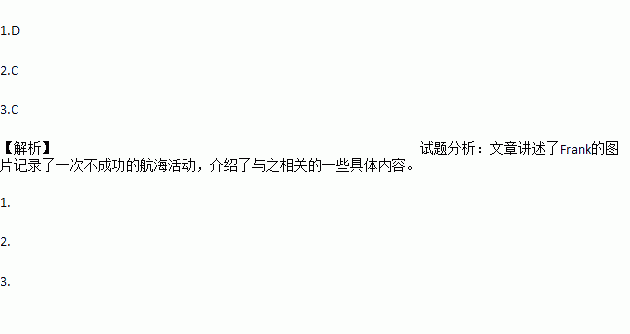题目内容
A new collection of photos brings an unsuccessful Antarctic voyage back to life.
Frank Hurley's pictures would be outstanding—undoubtedly first?rate photo?journalism—if they had been made last week.In fact,they were shot from 1914 through 1916, most of them after a disastrous shipwreck(海难), by a cameraman who had no reasonable expectation of survival.Many of the images were stored in an ice chest, under freezing water, in the damaged wooden ship.
The ship was the Endurance, a small, tight, Norwegian?built three?master that was intended to take Sir Ernest Shackleton and a small crew of seamen and scientists, 27 men in all,to the southernmost shore of Antarctica's Weddell Sea.From that point Shackleton wanted to force a passage by dog sled (雪橇) across the continent.The journey was intended to achieve more than what Captain Robert Falcon Scott had done.Captain Scott had reached the South Pole early in 1912 but had died with his four companions on the march back.
As writer Caroline Alexander makes clear in her forceful and well?researched story The Endurance, adventuring was even then a thoroughly commercial effort.Scott's last journey,completed as he lay in a tent dying of cold and hunger, caught the world's imagination, and a film made in his honor drew crowds.Shackleton, a onetime British merchant?navy officer who had got to within 100 miles of the South Pole in 1908, started a business before his 1914 voyage to make money from movie and still photography.Frank Hurley, a confident and gifted Australian photographer who knew the Antarctic,was hired to make the images, most of which have never before been published.
1.What do we know about the photos taken by Hurley?
A. They were made last week.
B. They showed undersea sceneries.
C. They were found by a cameraman.
D. They recorded a disastrous adventure.
2.Who reached the South Pole first according to the text?
A. Frank Hurley.
B. Ernest Shackleton.
C. Robert Falcon Scott.
D. Caroline Alexander.
3.What does Alexander think was the purpose of the 1914 voyage?
A. Artistic creation. B. Scientific research.
C. Money making. D. Treasure hunting.

